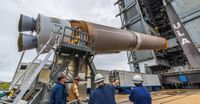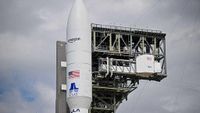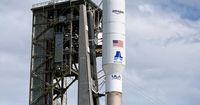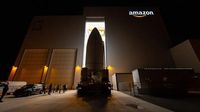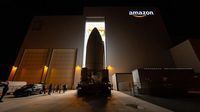Amazon's long-anticipated launch of its first 27 Kuiper internet satellites was postponed due to inclement weather on the evening of April 9, 2025. The mission, designated as KA-01 or Kuiper Atlas 1, was set to take off from Cape Canaveral Space Force Station in Florida. A United Launch Alliance (ULA) Atlas V rocket was prepared for the launch, but the countdown was halted as "stubborn cumulus clouds" and heavy winds rendered conditions unsafe for liftoff.
According to ULA, "Weather is observed and forecast NO GO for liftoff within the remaining launch window at Cape Canaveral this evening," as stated by Launch Weather Officer Brian Belson during a livestream update. The two-hour launch window had initially opened at 7 p.m. Eastern Time, but as the scheduled time approached, the weather conditions did not improve.
This setback marks a significant moment for Amazon as it seeks to enter the competitive satellite internet market, currently dominated by Elon Musk's SpaceX and its Starlink service, which operates approximately 8,000 satellites in orbit. Amazon first unveiled its plans for Project Kuiper six years ago, with a bold vision of launching a constellation of over 3,200 satellites to provide high-speed, low-latency internet access globally.
Project Kuiper is designed to cater to a diverse range of customers, including consumers, corporations, and governments. The service aims to bridge the digital divide by delivering internet access to underserved communities worldwide. Amazon anticipates rolling out commercial services later this year, contingent upon successful launches and deployments.
Despite the weather-induced delay, Amazon is under pressure to meet a Federal Communications Commission (FCC) requirement that mandates the company have 1,618 satellites in orbit by July 2026. This deadline is critical for Amazon to maintain its FCC clearance and avoid potential penalties. The company plans to ramp up its production and deployment rates following its first successful launch.
Amazon's commitment to Project Kuiper involves a substantial investment of $10 billion, reflecting the company's determination to establish itself as a serious competitor in the satellite internet arena. The project aims to not only provide internet service but also to integrate with Amazon Web Services, enhancing its appeal to businesses that require robust data solutions.
Industry experts, such as Mahdi Eslamimehr, executive vice president at Quandary Peak Research, believe Amazon is well-positioned to compete with Starlink. Eslamimehr noted, "Amazon has made extensive launch agreements with major providers such as ULA, Arianespace, Blue Origin, and even SpaceX itself, positioning Kuiper as a major challenger due to its expansive infrastructure and significant resources." He emphasized that while Starlink currently leads the market, it faces increasing competition from well-capitalized and strategically agile companies.
In preparation for the launch, Amazon had begun testing its satellite technology, successfully deploying two prototype satellites in October 2023. These prototypes were designed to evaluate the functionality of Kuiper's systems, paving the way for future launches. After thorough testing and updates to the satellite designs, Amazon is optimistic about the operational capabilities of its upcoming constellation.
Following the postponed launch, Amazon has not yet announced a new date for the mission. However, the company has assured stakeholders that they are actively monitoring weather conditions and will provide updates as soon as possible. The next mission will also utilize a ULA Atlas V rocket, indicating a continued partnership between the two companies.
As the competition in the satellite internet market heats up, the implications for consumers could be significant. More players in the field could lead to faster and more affordable internet services, particularly in rural and underserved areas where traditional broadband options are limited. With various companies vying for market share, the landscape of satellite internet is poised for transformation.
In the broader context of space exploration and technology, Amazon's Project Kuiper represents a crucial step toward addressing global connectivity challenges. By launching its satellite constellation, Amazon aims not only to compete with existing services but also to expand internet access to regions that have long been neglected.
As the world watches closely, the next steps for Amazon and Project Kuiper will be pivotal. The company is committed to launching its satellites and providing internet services that could ultimately reshape how people connect globally. With the clock ticking toward the FCC deadline, the anticipation surrounding Amazon's satellite launches continues to build.
In summary, while the weather may have delayed the launch of Project Kuiper's first satellites, the project remains a critical initiative for Amazon in its quest to revolutionize internet access. As the company prepares for future launches, it is clear that the race for satellite internet is far from over.
